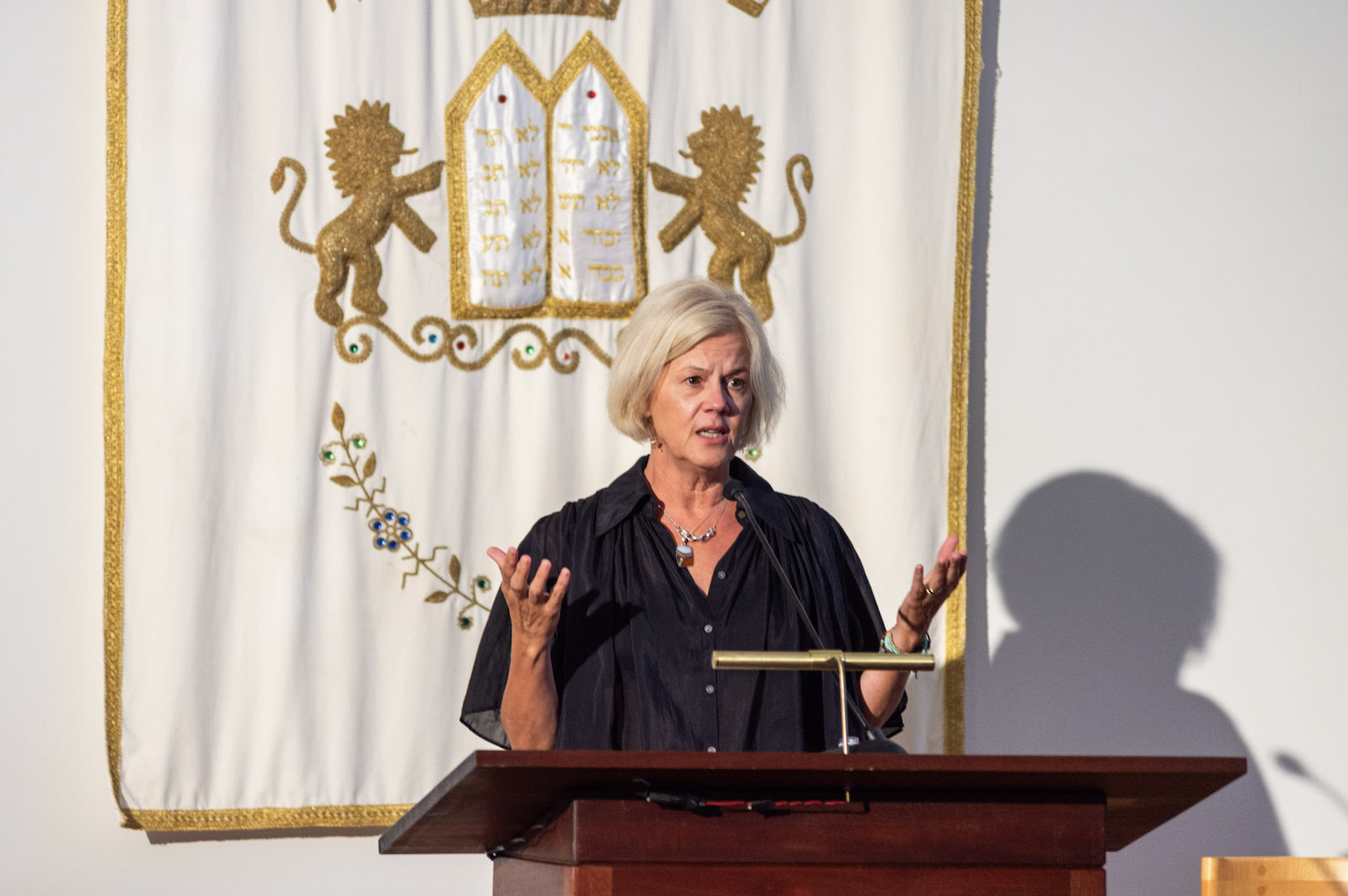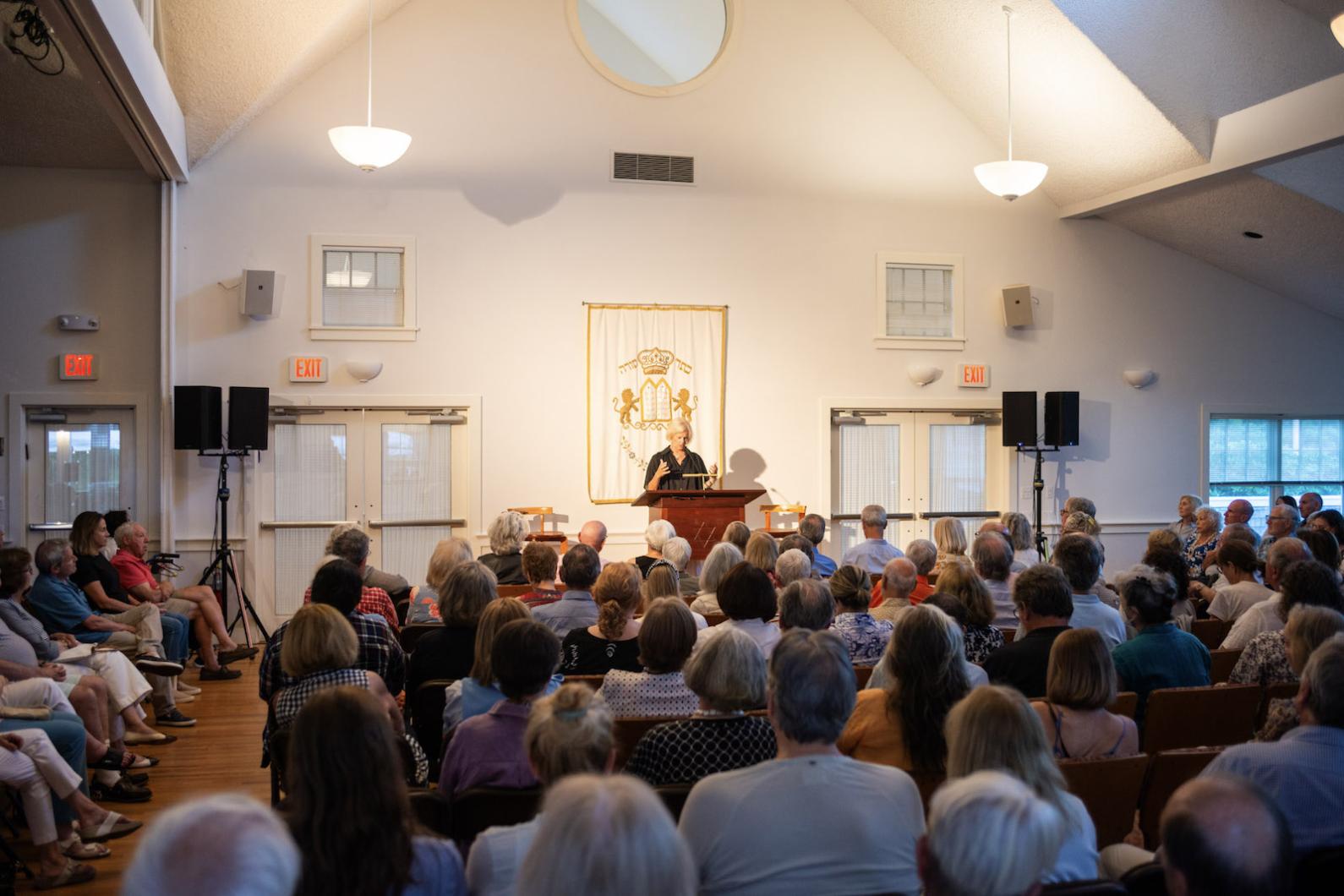Journalist and author Beth Macy believes two things are key to solving America’s overdose crisis: hope and help.
“We’ve got to make the treatments easier to get than the dope,” she said to the audience at the Martha’s Vineyard Hebrew Center Thursday evening.
“And right now, the dope is everywhere.”
Ms. Macy was on-Island as part of the Summer Institute speaker series. She is the author of four books, including Dopesick, which chronicled the culpability of the pharmaceutical industry in the Oxycontin epidemic and was made into a documentary series on Hulu. Her most recent book is Raising Lazarus, which continues to examine the opioid crisis and the people and parts of the country most affected by it.
Keith Heller, chair of the Summer Institute’s advisory committee, pointed out in his introduction that Martha’s Vineyard had six confirmed deaths from opioids in 2022, a number, he said, that likely underrepresents the actual amount of overdoses.

“The issue that she’s going to discuss is neither abstract nor is it distant,” Mr. Heller said. “It affects our community, our neighbors and sometimes our own families.”
Seven million people across the U.S. have opioid use disorder, a complex illness characterized by relapsing and compulsive opioid use, and one third of American families are affected by it in some way, Ms. Macy said.
“I like to begin by saying I’m sorry for your loss,” she said. “I know there are people in the room who have lost people to this. I know there are, everywhere I go.”
Ms. Macy told the crowd that initially she was having trouble while working on Raising Lazarus, but then a friend said something that helped.
“You do your best work when you write about the heroes,” she recalled her friend saying.
Thus, Raising Lazarus became about the people fighting on the front lines of the overdose crisis, places such as rural Appalachia where politics and stigma have historically made it challenging for people with addictions to get help.
Her talk, just like her book, focused on two strategies she believes are the solutions to the overdose crisis — harm reduction and medication-assisted treatment.
Harm reduction is an evidence-based strategy that works to reduce risks associated with drug use such as overdoses and the spread of infectious diseases, she said. Medication-assisted treatment is the use of medications such as buprenorphine, methadone and naltrexone alongside counseling to treat opioid use disorder.
During the talk, Ms. Macy shared stories of hope and hardship. Many people assume someone using drugs will eventually hit rock bottom and “snap out of it,” Ms. Macy said while talking about a woman she knew named Tess, who developed an addiction after being prescribed an opioid painkiller for bronchitis. Tess was eventually found murdered.
“Rock bottom had a basement,” Ms. Macy recalled Tess’s mother saying after her daughter died. “And that basement has a trap door.”
Ms. Macy also lifted up people providing care in innovative ways — through mobile clinics and locally-organized treatment facilities that offer needle exchanges, social services and general support for people who seek help.
She gave examples of the way these places reduce the stigma that many people with opioid use disorder face at hospitals “from doctors who refuse to get involved with those patients, to cranky lab techs who are doing urine screens, to mean people at the front desk.”
The solution she suggests is a basic one: see people with opioid use disorder as human beings with a medical condition. That is what the heroes she highlights in Raising Lazarus do, going to where people need help and offering whatever resources they can to reduce risk.
She described a mobile clinic in Hickory, N.C., run by nurse practitioner Tim Nolan who tells his patients to remember two things: they can get better and not to disappear.
“Whatever you do, even if you return to use before our next appointment — text me and I’ll come to you,” she said Mr. Nolan tells his patients.
Ms. Macy also shared stories of police, local governments, healthcare professionals, activists and patients working together to collaborate on harm reduction programs and to increase accessibility of medication-assisted treatment.
“What I’ve learned is that change happens when people get out of their silos,” she said. “When people with status in our communities stand up for the least among them, their peers in the community pay attention.”
After Ms. Macy finished, some attendees asked questions or shared brief stories about their own experiences with opioids.
Rabbi Caryn Broitman of the Martha’s Vineyard Hebrew Center said she felt harm reduction is a universal religious issue.
“I just want to say that all our religious communities should team up with medical and public health professionals to support harm reduction and care,” Rabbi Broitman said.
Sandy Sedacca, an administrator at Martha’s Vineyard Community Services, said she was grateful for Ms. Macy’s insights.
“We are a year-round, rural community, obviously coping with these issues, and doing the best to serve the community with all these kinds of interventions that you’ve described,” Ms. Sedacca said.
Martha’s Vineyard Community Services offers medication-assisted treatment to established patients through Island Counseling Center and other recovery support programs. Information about getting help or volunteering can be found at mvcommunityservices.org.
Ms. Macy told attendees the best way for them to help is to “nudge the powers that be to make treatments easier to get,” and volunteer with local harm reduction agencies.
“They are all running on duct tape and glue,” she said. “And they need our help.”
Rabbi David Saperstein, a former U.S. Ambassador-at-large for International Religious Freedom under former President Barack Obama, will be the next speaker in the Summer Institute series. His talk is Thursday, July 27 at 7:30 p.m. For information and tickets, visit mvsummerinstitute.org.






Comments (1)
Comments
Comment policy »